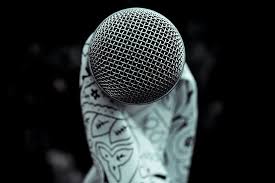In short pockets of free time that allow it, I have been embroidering lyrics of Cardi B and Megan Thee Stallion’s “WAP” on pinup girl fabric. The power this act holds is mighty, and you better believe it is some of my best art. When the song dropped, outrage sparked immediately. Conservative folks cried it was too inappropriate, people who believed they had superior music taste couldn’t believe such a song was released, claiming that they’ll just ‘stick to their [insert any generic alternative band]’. Political commentators even joined the discussion such as Ben Shapiro, who would only refer to the lyrics as “p-word,” or “female genitalia,” and then later implicated his wife as not having said “WAP,” and that women who do have vaginosis. So why are people okay with male rappers singing about sexual endeavors in graphic details, but when women do it, their songs are over-sexualized and inappropriate? Did you say misogyny? Ding Ding!
Not only has it finally become time for female rappers to take the lead as we’ve seen with artists like Nicki Minaj, Cardi B, and Megan Thee Stallion crushing the charts, but I believe it important too. Women can now find female agency in a usually male-dominated music scene that tends to paint only women’s submission. A chance for women to begin to cultivate a culture in which it is okay and safe to talk about their pleasure and their pleasure alone is an opportunity that should be greeted with open arms as we try to subvert and uproots systems in place that tell women they shouldn’t be so sexually liberated, let alone talk about it. It is even more exciting that Black women, those most often objectified and subjugated in male rap, are the ones pioneering this shift and reversal.
As these women continue to be pelted by society’s double standards in which men can vulgarly detail sexual exploits and women cannot sing about their own consensual pleasure, many people have openly supported the rejuvenating sex-positivity. Viola Davis took to Twitter to repost fan edits that superimposed her face over Cardi B and Kylie’s faces in the “WAP” music video, psychiatrists post about using it as an example of a healthy relationship in which both partner’s needs are satisfied. Between reactions like these and the onslaught of backlash, it become apparent as ever when a woman releases an explicit song that many folks are still extremely uncomfortable with women taking charge of their own bodies.The confident lyrics of women standing up for themselves and singing for themselves always ignites the cries of a man who realizes this is no longer a time where they own women and refute their needs. It’s 2020, and it’s about time we hear about a woman’s pleasure instead of a man’s, and that we teach women it’s okay to be sex-positive and talk about your own pleasures in society.
If you find yourself listening to songs like “WAP” and explicit female rap and find it too excessive, I ask that you do one of two things: 1. Turn it off and mind your business, or 2. Ask why you feel it excessive, and not just the right amount. Ask why you’re okay with Lil Wayne saying “almost drowned in her pussy so I swam to her butt,” but not Cardi and Megan singing “Wet Ass Pussy.” Folks with large platforms utilizing them to spread sex-positivity is important so that women can find their own agency within a male-dominated world and the belief in a male-dominated bedroom.
Though it a summer anthem I gladly blared in my house, my only wish for music like “WAP” is that we could safely party once more. I wish nothing more than to turn that song on and watch the power it brings through everyone dancing to it. (And if you would be someone standing against the walls with your arms crossed in protest, trust me when I say you’d definitely be missing out.)



